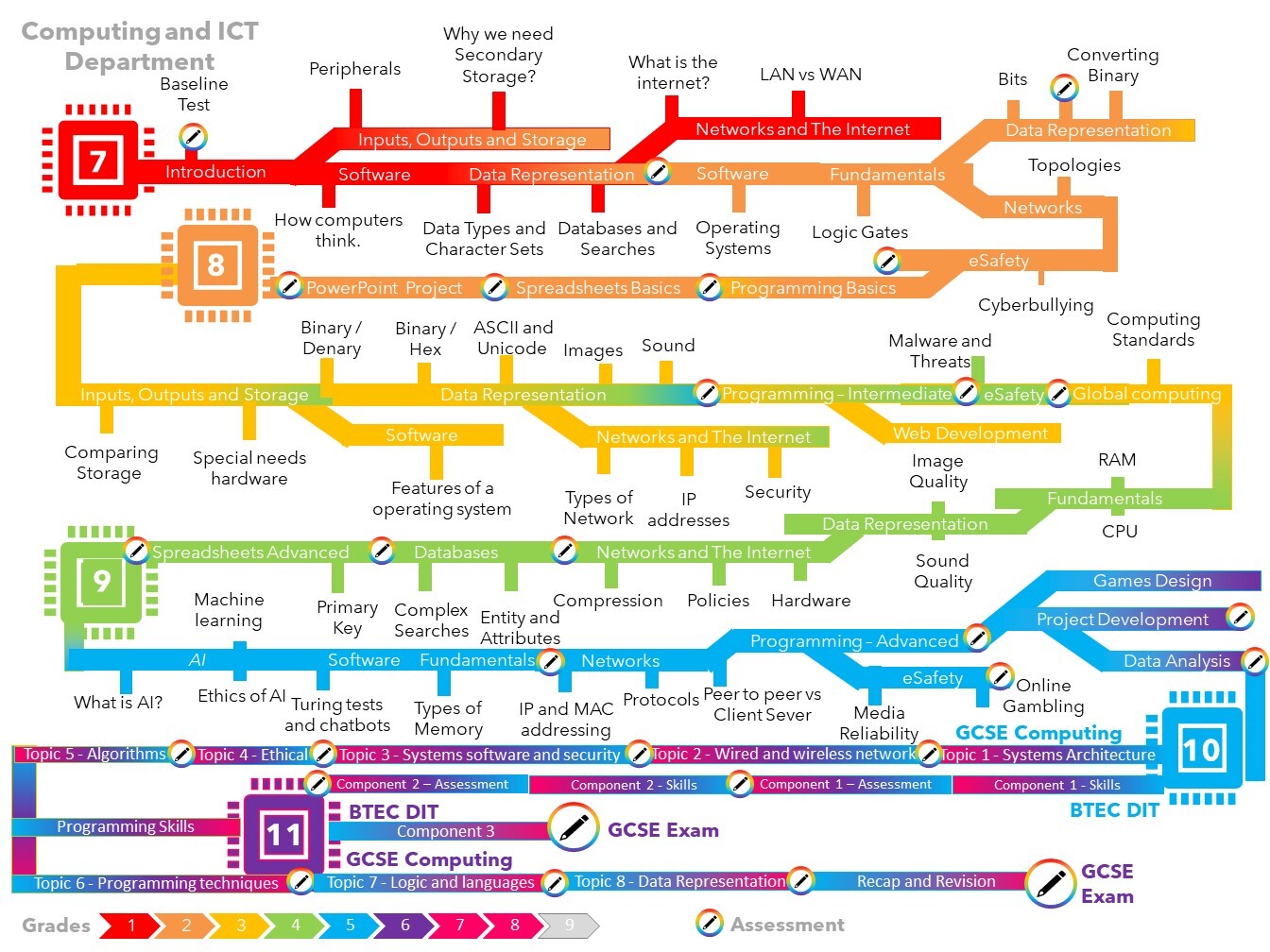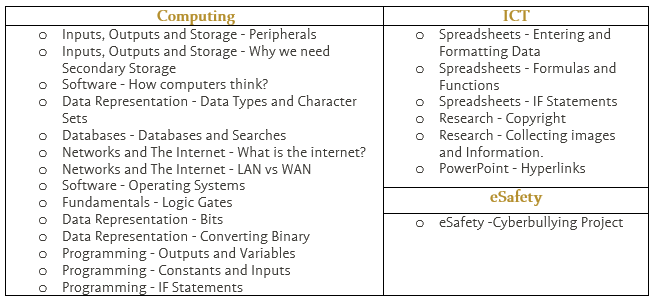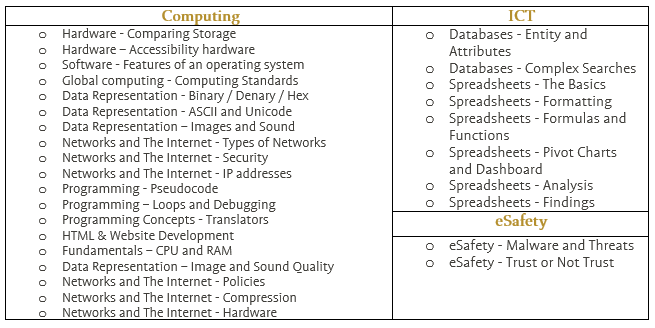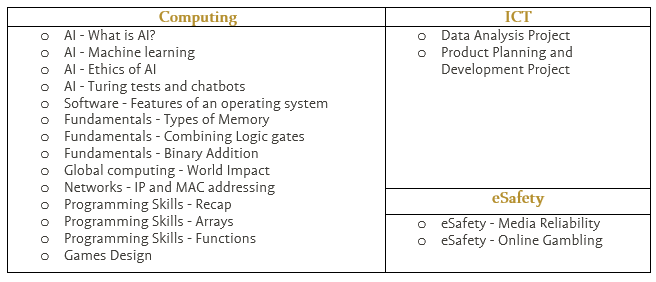- Home
- Curriculum
- Curriculum - Subject Content
Computing & ICT
 GBHS students learn Computing and ICT to…
GBHS students learn Computing and ICT to…
-
Become responsible safe users of technology and online services.
-
Be curious, creative and competent collaborators for the 21st century.
-
Computer Science at GBHS produces Pattern Finding, Problem Solving, Practical Thinkers.

Transferable Skills
-
Technical Skills
-
Critical Thinking
-
Problem Solving
-
Data Analysis
-
Time Management
-
Work Ethic
-
Extracting Important Information
-
Personal Motivation
-
Information Technology Skills
-
Meet Deadlines
-
Identifying Problems
-
Analysing Information
-
Research Skills
-
Numeracy Skills
-
Organisation
Key Stage 3
At KS3 all students follow a spiralling curriculum that builds on and develops their Computing, ICT and eSafety knowledge as well as developing their digital literacy.
Year 7 – Students receive 1hr of lessons every week.

Year 8 – Students receive 1.5hr of lessons every week. (3hr over the two-week timetable)

Year 9 – Students receive 1hr of lessons every week.

Key Stage 4
Level 2 BTEC Digital Information Technology
At KS4 we have two level 2 courses. All students will follow our core provision, Pearson BTEC Digital Information Technology L1/L2 course. This helps students to develop sector-specific knowledge and skills in a practical learning environment.
We cover project planning, designing and creating user interfaces, creating dashboards to present and interpret data, effective ways of working in digital information technology, legal and ethical codes of conduct; attitudes that are considered most important in digital information technology, including personal management and communication; knowledge that underpins effective use of skills, process and attitudes in the sector such as how different user interfaces meet user needs, how organisations collect and use data to make decisions, virtual workplaces, cyber security and legal and ethical issues. Students sit an external examination and undertake two internally assessed projects.
GCSE Computer Science
Students may also choose to take the OCR GCSE Computer Science which builds on the computing strand of the KS3 curriculum. Our GCSE in Computer Science is engaging and practical, encouraging creativity and problem solving. It encourages students to develop their understanding and application of the core concepts in computer science. Students also analyse problems in computational terms and devise creative solutions by designing, writing, testing and evaluating programs. Students will sit two external examinations and undertake a coding project which is internally assessed. OCR Specification code: J277
Key Stage 5
Within the Sixth Form, Computer Science and ICT are very popular choices with students making good progress and many going on to study IT and computing related courses at university level. Our Sixth Form courses are OCR A level Computer Science and the Cambridge Technical Award L3 in ICT. In September 2026, the Cambridge Technical Award L3 in ICT will be replaced by the Level 3 AAQ Cambridge Advanced National Extended Certificate in IT: DATA ANALYTICS
OCR A-Level Computer Science
Our A Level Computer Science qualification helps students understand the core academic principles of computer science. Classroom learning is transferred into creating real-world systems through the creation of an independent programming project. Our A Level will develop the student’s technical understanding and their ability to analyse and solve problems using computational thinking. Students will sit two external examinations and undertake a coding project which is internally assessed. OCR Specification code: H446
Cambridge Technicals Introductory Diploma in ICT (To be replaced in September 2026 by the Level 3 AAQ Cambridge Advanced National Extended Certificate in IT: DATA ANALYTICS)
Our OCR Cambridge Technicals in IT allows students to gain an insight into IT and cybersecurity. A wide range of units and pathways provide students with practical and project-based opportunities to develop knowledge and skills in areas such as infrastructure, application development and data analysis. Students will have the opportunity to create an app and build a website. Students will sit two external examinations and undertake three internally assessed units.
New for September 2026: Level 3 AAQ Cambridge Advanced National Extended Certificate in IT: DATA ANALYTICS. (Equivalent to one A Level)
This qualification will develop knowledge, understanding and skills that will help prepare students for progression to undergraduate study and are relevant to the information technology sector. The qualification will also help you develop independence and confidence in using skills that are relevant to the sector and that prepare you for progressing to university courses where independent study skills are needed.
The qualification will also help develop independence and confidence in using skills that are relevant to the sector and that prepare you for progressing to university courses where independent study skills are needed.
You might be interested in this qualification if you want to apply what you learn to practical, real-life contexts, such as:
- Planning, developing and reviewing spreadsheet data models that meet the needs of a client.
- Planning, developing and reviewing data visualisation solutions through the use of data dashboards that meet the needs of a client.
- Planning, developing and reviewing digital marketing campaigns that meet the needs of a client.
Social, Moral, Spiritual and Cultural Development
Social
The ICT curriculum at Great Baddow High School enables students to consider and produce work that meets the needs of different audiences within the community. Students’ are encouraged to research and work collaboratively to find appropriate solutions to issues that may affect particular groups within society. Students are able to develop their skills in a range of software in groups to find solutions whilst developing respect for the ideas and opinions of other students. Students look closely at the impact of ICT on society and the implications of the digital divide, identifying and offering solutions to issues caused by a lack of access to new and emerging technologies.
Moral
By looking at real world situations students are able consider the issues surrounding the misuse of personal data. The use of case studies encourages students to draw conclusions through evidence rather than their preconceptions whilst allow the students the time to reflect on their own personal perceptions of a topic. Students explore the use and misuse of advertising techniques by companies in relation to their use of music, images, personal opinions and statistics. Students are then able to develop their own morals by viewing the impacts of advertising.
Cultural
The students’ use of social networks is explored including how different nations censor the internet for their citizens and how this impacts on the culture. Students are also challenged to think about how differing cultures access and use the internet and what implications this has on the individual and the culture.
Spiritual
Students are always reflecting on ICT in their own lives and the lives of others as they look at various case studies. Students debate and together create their own set of values and beliefs based on their own experiences. Students will look at how ICT can bring rapid benefits to discussions and tolerance to an individual’s beliefs. They are also exposed to the abuse of the internet where they question and justify the aims, values and principles of their own and others’ belief systems.
Beyond the Classroom
The best way to support your child outside of the classroom is to help them keep up to date with ever changing technology stories as they are reported in the daily news. Additionally we encourage students to watch BBC Click!, Channel 5’s The Gadget Show and other technology and computing based media output.
It is not necessary for students to have access to any particular suite of software at home but within the faculty our most used programmes are the Microsoft Office suite and Adobe Design & Web Premium CS6 application software packages.
For programming we use Scratch, Python and HTML. These are available online and free to use as is the music manipulation software Audacity.
If a student struggles with computer access at home they are very welcome to use the facilities in school in the library at break, lunch or after school.
We also hold computer club every Thursday after school in H7 open to all students until 4.00 p.m. We offer opportunities to complete coursework, homework, build on software skills and start new projects.

